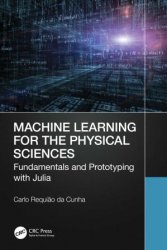Machine Learning for the Physical Sciences: Fundamentals and Prototyping with Julia
- Добавил: literator
- Дата: 31-10-2023, 08:02
- Комментариев: 0
 Название: Machine Learning for the Physical Sciences: Fundamentals and Prototyping with Julia
Название: Machine Learning for the Physical Sciences: Fundamentals and Prototyping with JuliaАвтор: Carlo Requiao da Cunha
Издательство: CRC Press
Год: 2024
Страниц: 289
Язык: английский
Формат: pdf (true)
Размер: 20.5 MB
Machine Learning is an exciting topic with a myriad of applications. However, most textbooks are targeted towards Computer Science students. This, however, creates a complication for scientists across the physical sciences that also want to understand the main concepts of Machine Learning and look ahead to applications and advancements in their fields.
This textbook bridges this gap, providing an introduction to the mathematical foundations for the main algorithms used in Machine Learning for those from the physical sciences, without a formal background in Computer Science. It demonstrates how Machine Learning can be used to solve problems in physics and engineering, targeting senior undergraduate and graduate students in physics and electrical engineering, alongside advanced researchers.
Although this book is about Machine Learning, it does not aim at teaching students how to code and use libraries popularized in the computer science community. Although this book is about physics, it does not aim at teaching students how to solve particular problems in physics. The main goal was to translate many Machine Learning algorithms into a language that physicists can understand and use. To achieve this goal, a combination of discussions, mathematical formalism, and coding was used. The language chosen for the codes was Julia for two reasons: i) it is a very readable language that maps mathematics to code very clearly, and ii) the execution of its programs can be significantly faster than that of many other languages, and this is particularly necessary for solving problems in physics.
Key Features:
Includes detailed algorithms
Supplemented by codes in Julia: a high-performing language and one that is easy to read for those in the natural sciences
All algorithms are presented with a good mathematical background
Скачать Machine Learning for the Physical Sciences: Fundamentals and Prototyping with Julia
Внимание
Уважаемый посетитель, Вы зашли на сайт как незарегистрированный пользователь.
Мы рекомендуем Вам зарегистрироваться либо войти на сайт под своим именем.
Уважаемый посетитель, Вы зашли на сайт как незарегистрированный пользователь.
Мы рекомендуем Вам зарегистрироваться либо войти на сайт под своим именем.
Информация
Посетители, находящиеся в группе Гости, не могут оставлять комментарии к данной публикации.
Посетители, находящиеся в группе Гости, не могут оставлять комментарии к данной публикации.
